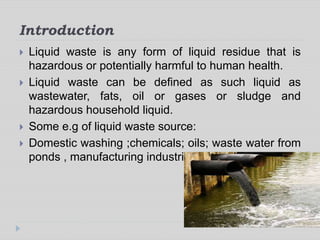Getting My Reclaim Waste To Work
Getting My Reclaim Waste To Work
Blog Article
Reclaim Waste for Beginners
Table of Contents3 Easy Facts About Reclaim Waste ShownRumored Buzz on Reclaim WasteHow Reclaim Waste can Save You Time, Stress, and Money.Little Known Questions About Reclaim Waste.Not known Incorrect Statements About Reclaim Waste
Explore the kinds, occurrences, and forms of fluid waste. Domestic sewer waste refers to the waste and products from a property septic storage tank. This sort of waste is produced by people in houses, colleges, and various other structures. This only includes septic storage tanks that have a drain area. The appropriate management and disposal of residential sewer waste call for fluid waste to be transferred to a sewer treatment plant where the proper methods and equipment are related to detoxify and dispose of waste.
Business waste commonly includes possible hazards, such as combustible products or a mixture of fluid and strong waste items, and needs an advanced and comprehensive disposal process. The disposal of industrial waste typically involves the purification of waste prior to transportation to make sure secure and appropriate disposal. Hazardous waste is produced from by-products and runoff of commercial processes and production.
This type of waste can not make use of the very same sewer administration transportation or processes as septic or business fluids. The industrial waste monitoring process calls for the examination and screening of fluid waste before it undertakes the disposal procedure (liquid waste removal melbourne). Overflow waste is the fluid waste that comes from overflow and excess stormwater in highly inhabited locations or cities
Overflow waste can trigger contamination and flooding if not handled effectively. Making certain proper waste monitoring can protect against catastrophes and minimize environmental harm.
The Best Guide To Reclaim Waste
Contact PROS Solutions today to learn more about our waste monitoring and disposal solutions and the appropriate methods to take care of the liquid waste you generate.
(https://triberr.com/reclaimwaste1)This supposed 'wastewater' is not just a crucial source yet, after therapy, will be released to our land, rivers or the sea. Used water from commodes, showers, baths, kitchen area sinks, washings and commercial procedures is recognized as wastewater.

water utilized to cool equipment or tidy plant and equipment). Stormwater, a type of wastewater, is overflow that flows from agricultural and urban areas such as roofings, parks, gardens, roadways, courses and seamless gutters right into stormwater drains pipes, after rainfall. Stormwater streams unattended directly to neighborhood creeks or rivers, at some point reaching the sea.
Reclaim Waste Things To Know Before You Get This
In Queensland, most wastewater is treated at sewer therapy plants. Wastewater is transported from residential or industrial sites through a system of drains and pump stations, known as sewerage reticulation, to a sewage therapy plant.
The Division of Natural Resources recommends city governments about managing, operating and preserving sewerage systems and treatment plants. In unsewered locations, neighborhood federal governments may require householders to set up specific or family sewage treatment systems to treat domestic wastewater from toilets, kitchen areas, washrooms and washings. The Department of Natural Resources authorises making use of home systems when they are verified to be effective.
Most stormwater obtains no therapy. In some brand-new neighborhoods, therapy of some stormwater to get rid of trash, sand and gravel has begun utilizing gross pollutant catches. Wastewater therapy occurs in 4 phases: Gets rid of strong matter. Bigger solids, such as plastics and other things incorrectly discharged to sewers, are removed when wastewater is travelled through displays.
Uses small living microorganisms knows as micro-organisms to damage down and remove continuing to be dissolved wastes and great particles. Micro-organisms and wastes are included in the sludge.
The smart Trick of Reclaim Waste That Nobody is Discussing
Nutrient elimination is not available in all sewer treatment plants due to the fact that it needs pricey specialised devices. It is becoming extra common in Queensland. Clear liquid effluent created after therapy might still consist of disease-causing micro-organisms. If this effluent is launched into waterways such as rivers or the sea, the micro-organisms will ultimately pass away out.

This usually means wastewater needs to be dealt with or pollutants gotten rid of prior to it can be released to rivers. Many wastewater flows into the sewerage system. Under the Act, local governments carry out authorizations and permits for environmentally pertinent activities (Ages) involving wastewater launches that could have a neighborhood influence. The division administers approvals and licences to ERAs involving wastewater launches that might hop over to these guys have a local or statewide effect.
Reclaim Waste Can Be Fun For Anyone
Or else, examples are considered research laboratory evaluation. Commonly numerous tests are needed to establish the levels of each of the different toxins such as oils, heavy steels and pesticides in water. Tracking supplies factual details concerning water quality and can verify that licence problems are being met. The information acquired with surveillance offers the basis for making water top quality choices.
Report this page